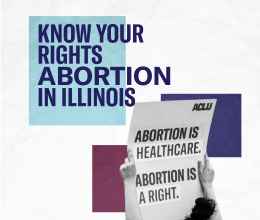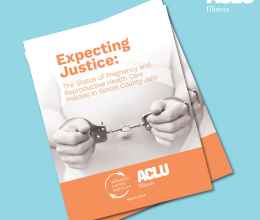By Kristin Pagano
I was six months pregnant when I moved from California to Illinois last fall. I was already a licensed attorney in California, but I needed to take the Illinois bar exam in order to continue practicing law. I signed up for the February bar exam, scheduled only nine weeks after my due date. I knew I could do it with the support of my husband and my family.
I also planned to exclusively breastfeed. No problem, I thought. I would request an accommodation to pump breast milk during the exam. I filled out the “Non-standard Testing Accommodation Request” along with medical documentation and submitted it with my application materials. To my surprise, my request was denied. The Illinois Board of Admissions to the bar informed me that breastfeeding “is not a physical disability and therefore not covered under the Americans with Disabilities Act.”
This caught me off guard. I knew that failure to pump on a regular schedule could lead to serious medical consequences, such as pain and infection. I also knew that disrupting my pumping schedule would affect my milk supply and my ability to feed my baby. I was left with two options for this two-day marathon exam: Suffer through pain and distraction while risking my health or put off the exam altogether.
These were not acceptable options. No woman should be forced to choose between pursuing her career goals and her health and that of her child. It was 2014, for goodness sakes!
I successfully appealed the decision and the Illinois board agreed to grant the accommodations. In response to my case and similar cases in Texas and Kentucky, the ACLU and Law Students for Reproductive Justice launched a nationwide initiative addressing this issue. Modeled after advocacy by the ACLU of Illinois, the initiative’s goal is to ensure that all breastfeeding bar examinees are eligible to receive accommodations, no matter where they are taking the exam.
I’m happy to report that both Illinois and Texas have already changed their policies and practices in response to this campaign. However, the ACLU-LSRJ initiative shows that there is much more work to be done.
Today the ACLU-LSRJ initiative is releasing a “report card” showing how each state is doing. Click here to see how your state is doing.
The ACLU-LSRJ surveyed the policies and practices of each state’s bar exam. Here’s what they found:
- With the exception of 5 states, information available on bar examiner websites suggests that only people with documented disabilities are eligible for accommodations. Since breastfeeding is not a disability, many candidates may not even bother seeking accommodations. Those who do may nevertheless be denied because the forms inadequately address breastfeeding. These forms are for the most part inapplicable, since they ask for physician opinions such as diagnoses and treatment of a disability.
- Two states — Alabama and Louisiana — have an explicit policy that breastfeeding examinees are categorically ineligible for accommodations.
- Many (14) states have no policy addressing accommodation eligibility for breastfeeding examinees and review applications on a case-by-case basis. While some states have in fact granted such accommodations in the past, experience suggests that in other states these accommodations may be available only in theory.
- Specific types of accommodations vary state by state. 23 states would not confirm how they accommodate breastfeeding examinees, repeating that applications for specific accommodations are reviewed on a case-by-case basis. 18 states claim that they allow examinees to bring their breast pumps and supplies to the test location while also permitting access to a private location to pump. However, only 12 states responded that examinees may receive additional break time.
Obviously, this issue is very personal for me. As a result of my experience, I feel I have a responsibility to speak up for other breastfeeding law students and lawyers. Existing bar exam policies create a significant hurdle for mothers who want to begin their legal careers. State boards need to change their policies to help eliminate the barriers that women encounter in the legal profession.
Last week, the ACLU and LSRJ shared their findings with each state board and recommended policy changes. The initiative argues that making pumping accommodations more readily available would further public health policy in favor of breastfeeding and “fulfill the boards’ obligation to administer the test in a non-discriminatory manner.”
The ACLU and LSRJ recommended the following reforms:
- Adoption of a policy that explicitly extends eligibility for test accommodations to those who are breastfeeding, including: Access to a private location, other than a restroom, to express breast milk; access to an electrical source; permission to bring medical equipment and supplies to the test site; and additional stop-the-clock breaks, if necessary.
- Modification of existing resources related to testing accommodations to clarify that breastfeeding examinees are eligible to seek such accommodations and ensure that all forms are made inclusive of and applicable to breastfeeding. This could include print and online forms, instructions, and other materials.
- Training for managers and staff to ensure that consistent and correct information is given to those who inquire as to eligibility.
The report card findings highlight the widespread barriers that women face in pursuit of their legal careers. State boards must acknowledge that their outdated policies contribute to this problem and must take an active role in eliminating these barriers. Women should not be forced to make a decision between their families and their careers.
Moms can be lawyers, too!





